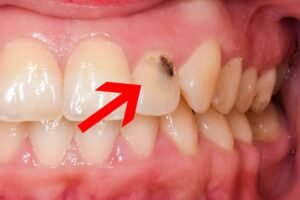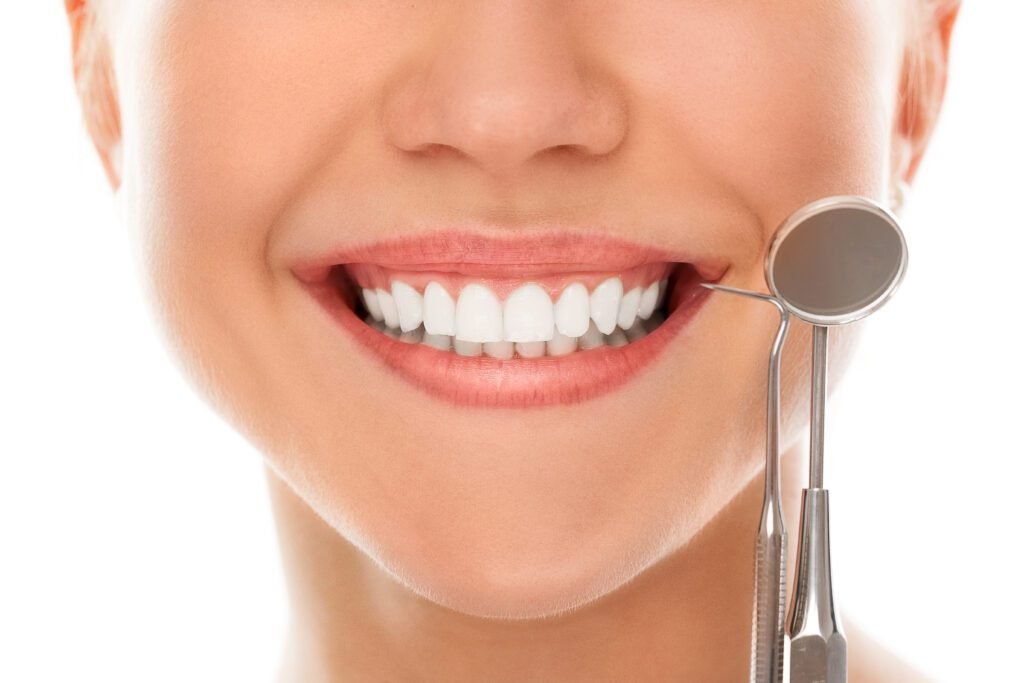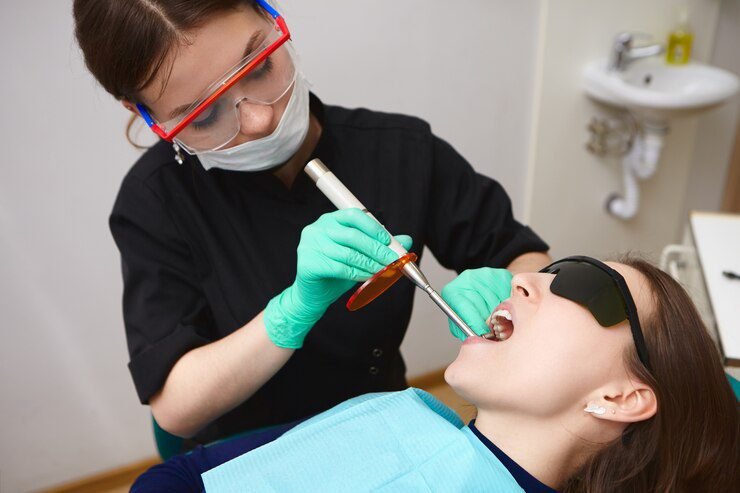Table of Contents
Understanding the Causes of Front Teeth Cavities
To understand the causes of front teeth cavities, it is important to first recognize the structure and vulnerability of these teeth. The front teeth, also known as incisors, are located at the front of the mouth and have a thin layer of enamel compared to the molars at the back. This thin enamel layer, coupled with their prominent position, makes them more susceptible to cavities.

The primary cause of front teeth cavities is poor oral hygiene. When proper brushing and flossing techniques are not followed, plaque buildup occurs on the teeth. Plaque is a sticky film that contains bacteria, which produce acid when they come into contact with sugars and starches from foods and drinks. This acid attack weakens the enamel, leading to cavities. Additionally, lack of regular dental check-ups and cleanings can contribute to the development of cavities as potential issues go unchecked and untreated.
Adopting a Thorough Oral Hygiene Routine
Maintaining a thorough oral hygiene routine is crucial for preventing front teeth cavities and ensuring overall oral health. By adopting a consistent and effective regimen, you can significantly reduce the risk of tooth decay and other dental issues.
The foundation of a proper oral hygiene routine lies in regular brushing. Dentists recommend brushing your front teeth at least twice a day, using a soft-bristle toothbrush. Using gentle, circular motions, make sure to cover all surfaces of the teeth, including the front, back, and chewing surfaces. This helps remove plaque, bacteria, and food particles that can contribute to cavity formation. Additionally, it is important to replace your toothbrush every three to four months, or sooner if the bristles become frayed, to ensure optimal cleaning.
Choosing the Right Toothbrush and Toothpaste
The right toothbrush and toothpaste can make a significant difference in maintaining the health of your front teeth. When it comes to choosing a toothbrush, opt for one with soft bristles. Hard bristles can be too abrasive on the delicate enamel of the front teeth, potentially causing damage over time. Soft bristles are gentle yet effective in removing plaque and food particles from the crevices of the teeth.

Additionally, consider the size and shape of the toothbrush head. A small head allows for better maneuverability and access to hard-to-reach areas, such as the back of the front teeth. Look for a toothbrush with a comfortable handle that provides a secure grip, making it easier to brush effectively. Remember to replace your toothbrush every three to four months or sooner if the bristles become frayed as worn-out bristles are less effective in cleaning the teeth properly.
Similarly, choosing the right toothpaste is essential for maintaining the health of your front teeth. Look for a toothpaste that contains fluoride, as this mineral helps to strengthen the enamel, making it more resistant to cavities. Fluoride toothpaste can also help to remineralize areas that may have started to decay. Additionally, consider toothpaste with ingredients that cater to specific needs such as sensitivity, stain removal, or tartar control.
In conclusion, selecting the right toothbrush and toothpaste can play a crucial role in maintaining the health of your front teeth. Opt for a toothbrush with soft bristles and a small head for better maneuverability. Look for a toothpaste that contains fluoride to strengthen the enamel and address any specific concerns such as sensitivity or stain removal. By making informed choices, you can enhance your oral hygiene routine and minimize the risk of front teeth cavities.
Proper Brushing Techniques for Front Teeth
When it comes to maintaining optimal oral health, proper brushing techniques for front teeth play a crucial role. The front teeth are not only highly visible but also more susceptible to cavities due to their position in the mouth. Therefore, it is important to use the correct brushing technique to effectively remove plaque and prevent tooth decay.
First and foremost, it is essential to choose a toothbrush with soft bristles to avoid causing any damage to the delicate enamel of the front teeth. The toothbrush should be held at a 45-degree angle towards the gum line, allowing the bristles to reach both the teeth and the gum margins. Using gentle, circular motions, brush the front teeth thoroughly for at least two minutes, paying extra attention to the areas where the teeth and gums meet. Be sure to brush all surfaces of the front teeth, including the inner and outer surfaces as well as the chewing surfaces. Using a toothpaste containing fluoride is also recommended for added protection against cavities.
The Importance of Flossing for Front Teeth Cavities
Flossing is often overlooked in the daily oral hygiene routine, but it plays a crucial role in preventing front teeth cavities. While brushing cleans the surfaces of the teeth, it cannot effectively reach the tight spaces between them. This is where flossing comes in, as it removes plaque and food particles that can contribute to cavity formation.
When you don’t floss regularly, the plaque buildup in between your front teeth can harden and turn into tartar, which cannot be removed by brushing alone. This tartar can irritate the gums and lead to gum disease, further increasing the risk of cavities. By incorporating flossing into your oral care routine, you can effectively remove the plaque and bacteria from these hard-to-reach areas, reducing the chances of cavities and improving overall oral health.
Flossing should be done at least once a day, preferably before brushing your teeth. It is important to use a gentle, back-and-forth motion to avoid injuring the gums. Some people may find traditional dental floss difficult to handle, in which case flossing picks or water flossers can be used as alternatives. The key is to find a flossing method that works best for you and allows for thorough cleaning between your front teeth. Remember, a small investment of time in flossing now can save you from potential dental problems in the future.
Incorporating Mouthwash into Your Oral Care Routine

Mouthwash is an effective addition to your oral care routine when it comes to preventing front teeth cavities. It not only freshens your breath, but it also helps to kill bacteria and reduce plaque that can lead to tooth decay. Incorporating mouthwash into your daily routine can provide an extra layer of protection for your front teeth.
When choosing a mouthwash, it is important to look for one that contains fluoride. Fluoride is a mineral that helps to strengthen tooth enamel, making it more resistant to acid attacks and cavities. Using a fluoride mouthwash can provide an added boost of protection for your front teeth, particularly if you are at a higher risk for cavities.
To incorporate mouthwash into your oral care routine, simply rinse your mouth with the recommended amount of mouthwash for the specified time indicated on the product label. Swish the mouthwash around your mouth, making sure to reach all areas, including the front teeth. Do not swallow the mouthwash, but instead, spit it out after rinsing. It is important to note that mouthwash should not replace brushing and flossing, but rather be used as a supplementary step to further enhance your oral health.
Regular Dental Check-ups and Cleanings
Regular dental check-ups and cleanings are essential for maintaining optimal oral health. Many individuals mistakenly believe that they only need to visit the dentist when they experience pain or other dental issues. However, preventive care is the cornerstone of good dental health, and regular check-ups and cleanings play a vital role in preventing front teeth cavities.
During a dental check-up, your dentist will thoroughly examine your teeth, gums, and other oral structures. This allows them to detect any signs of tooth decay, gum disease, or other dental problems at their earliest stages. Early detection is crucial as it enables prompt intervention and prevents the problem from worsening. In addition, your dentist will perform a professional cleaning, removing plaque and tartar buildup that cannot be adequately addressed through regular brushing and flossing alone.
By scheduling regular dental check-ups and cleanings, you can ensure that your front teeth are in optimal condition. Not only will this prevent cavities, but it will also promote overall oral health and help you maintain a beautiful smile. So don’t wait until you experience dental problems – make it a priority to visit your dentist at least twice a year for routine check-ups and cleanings.
The Role of Diet in Preventing Front Teeth Cavities
A healthy diet plays a pivotal role in preventing front teeth cavities. What we eat and drink can have a significant impact on the health of our teeth, including our front teeth. Consuming a balanced diet that is rich in essential nutrients can help support strong and cavity-resistant teeth.

One of the key nutrients for dental health is calcium. Calcium helps to strengthen and re-mineralize the enamel, the protective outer layer of our teeth. Incorporating foods like milk, cheese, yogurt, and leafy green vegetables into your diet can provide a good source of calcium. Additionally, it is important to ensure an adequate intake of vitamin D, which helps the body absorb and utilize calcium effectively. This can be obtained through exposure to sunlight or by consuming foods such as fatty fish, fortified cereals, and egg yolks. By including these calcium-rich foods in your diet, you can help fortify your front teeth against cavities and maintain their health and integrity.
Limiting Sugary and Acidic Foods and Drinks
Sugary and acidic foods and drinks can have a detrimental impact on the health of our front teeth. When we consume foods and beverages that are high in sugar, such as candies, sodas, and desserts, the bacteria in our mouths feed on these sugars and produce acids. These acids can then attack the enamel of our front teeth, leading to the formation of cavities. Similarly, acidic foods and drinks, like citrus fruits and carbonated beverages, can erode the enamel, making our front teeth more susceptible to cavities.
To limit the negative effects of sugary and acidic foods and drinks on our front teeth, it is important to make some dietary adjustments. Opt for healthier alternatives instead of indulging in sugary snacks and drinks. Choose fresh fruits, vegetables, and whole grains as part of a balanced diet. It is also advisable to rinse your mouth with water after consuming sugary or acidic beverages to help wash away any residue. By incorporating these simple changes into your diet, you can help protect your front teeth from cavities and maintain a healthy smile.
Utilizing Fluoride Treatments for Strengthening Front Teeth
Fluoride treatments are a valuable tool for strengthening the front teeth and protecting against cavities. Fluoride is a naturally occurring mineral that has been shown to strengthen tooth enamel and prevent tooth decay. When applied directly to the teeth in the form of a gel, varnish, or rinse, fluoride can effectively penetrate the enamel and promote re-mineralization, making the teeth more resistant to acid attacks.
Research has consistently shown that fluoride treatments can significantly reduce the risk of cavities in both children and adults. In fact, the Centers for Disease Control and Prevention (CDC) lists community water fluoridation as one of the 10 great public health achievements of the 20th century. This simple and cost-effective measure has led to a dramatic decline in tooth decay rates, particularly in communities with fluoridated water supplies.
Fluoride treatments can be especially beneficial for strengthening the front teeth, as these teeth are more prone to cavities due to their exposure to food and drinks, as well as the potential for trauma or wear. Children and teenagers, in particular, can benefit from fluoride treatments as their permanent front teeth are developing. However, it is important to note that fluoride treatments should be used in conjunction with a thorough oral hygiene routine, regular dental check-ups, and a balanced diet to ensure optimal dental health.
Dental Sealants for Extra Protection against Cavities
Dental sealants are a highly effective method for providing extra protection against cavities, especially in the front teeth. These thin, plastic coatings are applied to the chewing surfaces of the teeth, creating a barrier that prevents bacteria and food particles from getting trapped in the deep grooves and pits. By sealing off these vulnerable areas, dental sealants help reduce the risk of tooth decay, particularly in children and adolescents who may have difficulty maintaining thorough oral hygiene.
Research has shown that dental sealants can significantly reduce the incidence of cavities in the permanent molars, with one study reporting a 60% decrease in tooth decay among children who had sealants applied. The procedure is quick and painless, requiring no drilling or removal of tooth structure. After a thorough cleaning, the dentist or dental hygienist simply brushes on the sealant material and allows it to bond to the tooth surface with the help of a curing light. The whole process takes only a few minutes per tooth and can provide protection for years.
It is important to note that dental sealants are not a substitute for regular oral hygiene practices, such as brushing and flossing. They are, however, an excellent complement to a comprehensive preventive dental care routine. By incorporating dental sealants into your child’s oral health care, you can provide an extra layer of defense against cavities and ensure their teeth stay healthy and strong.
Addressing Dry Mouth and Its Impact on Front Teeth Health
Dry mouth, also known as xerostomia, is a condition that occurs when there is a decrease in the production of saliva in the mouth. This can have a significant impact on the health of the front teeth. Saliva plays a crucial role in maintaining oral health as it helps to neutralize acids, wash away food particles, and fight against bacteria that can lead to cavities. When there is a lack of saliva, these protective functions are compromised, leaving the front teeth vulnerable to the development of cavities.
Dry mouth can be caused by a variety of factors including medication side effects, certain medical conditions, dehydration, and lifestyle factors such as smoking or excessive alcohol consumption. If left untreated, dry mouth can lead to a range of oral health problems, including an increased risk of cavities in the front teeth. It is important to address dry mouth and take steps to alleviate the symptoms in order to protect the health of your front teeth. In the following sections, we will explore some practical strategies and tips for managing and addressing dry mouth effectively.
Understanding the Signs and Symptoms of Front Teeth Cavities
Cavities are a common dental problem that many people face, and being able to recognize the signs and symptoms of front teeth cavities is crucial for early intervention and treatment. One of the most noticeable signs is tooth sensitivity, especially when consuming hot or cold foods and drinks. This sensitivity occurs when the protective enamel layer has been compromised, allowing temperature changes to reach the nerves inside the tooth.
Additionally, individuals with front teeth cavities may experience toothache or pain, which can range from mild discomfort to sharp, throbbing sensations. This pain may worsen when chewing or biting down on food. It is important to note that not all cavities cause pain, making regular dental check-ups even more essential in identifying and treating these issues early on.
Visual cues can also indicate the presence of front teeth cavities. These may include the appearance of dark spots or holes on the affected tooth’s surface. When cavities progress, they can lead to the formation of pits and craters on the enamel. In severe cases, the cavity may become visible as a visible hole in the tooth. Another visual symptom is the presence of white spots on teeth, which can be an early indicator of enamel de-mineralization, a precursor to cavities.
Furthermore, if you notice any changes in the texture of your teeth, such as rough or pitted surfaces, it could be a sign of enamel erosion caused by cavities. Regular self-examinations, along with professional dental evaluations, can help identify these signs and symptoms early and prevent further decay.
How can I tell if I have a cavity in my front teeth?
Some common signs and symptoms of front teeth cavities include tooth sensitivity, toothaches, visible holes or pits in the teeth, discoloration or staining, and pain when biting or chewing.
Can a thorough oral hygiene routine prevent cavities in front teeth?
Yes, adopting a thorough oral hygiene routine, which includes brushing twice a day, flossing daily, and using mouthwash, can help prevent cavities in front teeth.
What kind of toothbrush and toothpaste should I use to prevent front teeth cavities?
It is recommended to choose a soft-bristled toothbrush and fluoride toothpaste to effectively clean and protect your front teeth against cavities.
How should I brush my front teeth properly?
To properly brush your front teeth, hold your toothbrush at a 45-degree angle to your gums, use gentle circular motions, and make sure to brush all surfaces of your front teeth, including the front, back, and chewing surfaces.
Is flossing important for preventing front teeth cavities?
Yes, flossing is crucial for preventing front teeth cavities as it removes plaque and food particles from between the teeth and along the gumline, where toothbrush bristles cannot reach.
Should I incorporate mouthwash into my oral care routine to prevent front teeth cavities?
Yes, incorporating mouthwash into your oral care routine can help reduce bacteria in your mouth, freshen your breath, and provide additional protection against front teeth cavities.
How often should I go for dental check-ups and cleanings to prevent front teeth cavities?
It is recommended to visit your dentist every six months for regular check-ups and cleanings to detect and prevent cavities in your front teeth.
Can my diet affect the health of my front teeth?
Yes, your diet plays a significant role in preventing front teeth cavities. Limiting sugary and acidic foods and drinks can help protect your front teeth from decay.
Are fluoride treatments beneficial for strengthening front teeth and preventing cavities?
Yes, fluoride treatments can strengthen the enamel of your front teeth, making them more resistant to decay and helping to prevent cavities.
What are dental sealants, and how do they protect front teeth against cavities?
Dental sealants are thin, protective coatings that are applied to the chewing surfaces of your front teeth. They act as a barrier, preventing bacteria and food particles from getting trapped and causing cavities.
How does dry mouth impact the health of front teeth?
Dry mouth can increase the risk of cavities in front teeth because saliva helps to wash away food particles and neutralize acids in the mouth. Without enough saliva, the teeth are more susceptible to decay.












